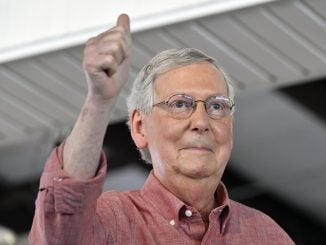Senate GOP leader Mitch McConnell expertly timed a proposal on Oct. 6 — after the “markets” closed — to go along with a temporary, conditional “deal” to extend our government’s debt limit until December.
Some of McConnell’s GOP colleagues and others on the right accused him of caving. U.S. Sen. Lindsey Graham (R-SC), ranking Republican on the Senate Budget Committee, said “I don’t want any Republican fingerprints on raising the debt limit.” Sen. Ted Cruz (R-TX) said, “Our leadership got cold feet, they got weak-kneed because they were afraid (Sen. Joe) Manchin (D-WV) and (Sen. Kyrsten) Sinema (D-AZ) would agree to nuke the filibuster, which is what has been threatened over and over again.”
While Democratic leader Chuck Schumer tried to take credit for McConnell’s alleged cave, his own colleagues weren’t so pleased. “That sounds like a terrible idea,” said Sen. Chris Murphy (D-CT). “It sounds like more games from Senator McConnell.” Democratic Whip Dick Durbin (D-IL) tersely reacted, “We’ll see.” Hawaii’s Mazie Hirona unceremoniously called it “Bulls—t.”
McConnell’s well-timed gambit was brilliant and wholly consistent with his statements since July that Democrats can raise the debt limit on their own via the filibuster-free budget reconciliation bill of their own making. He laid the trap and Democrats reluctantly walked right into it. Having backed themselves into a corner, they had no choice. It was reminiscent of the legendary parliamentary mastery of the late Sen. Jesse Helms (R-NC).
It was no secret that Republicans were willing to give Democrats more time to avoid a potentially harmful impact on financial markets. But McConnell’s timing allowed him to take credit for the next day’s stock market rally, coupled with credit from jittery financial executives for calming market fears.
He also relieved pressure on Sens. Manchin and Sinema that might have forced them into a bad deal, thus giving Biden and Democrats a political “victory.”
Yes, McConnell bailed Democrats out of their situation. But to do otherwise likely would have resulted in finger-pointing and financially disruptive activities that would have undermined confidence in U.S. financial markets. Panicky Democrats might have capitulated to the #MintTheCoin movement for a $1 Trillion Platinum coin (or two), a likely illegal and highly ill-advised gimmick. Threats to undermine or eliminate the filibuster — the requirement for a three-fifths supermajority to end debate on most legislation — were always empty.
Yes, we can argue whether the administration’s threats of financial “disaster” were warranted, and to what extent. But our views don’t count. Those on Wall Street with big offices and trillions of dollars at stake do.
Polls show that most Americans blame Democrats for the debt-limit debacle. But public opinion can shift. McConnell knows that if disruptions occurred, prices would be paid by everyone, regardless of party. Whatever confidence the public still has in Congress and the executive to deal with real issues would have been obliterated.
McConnell’s offer only required 10 votes from his caucus (he got 11), which was never in doubt, along with every Democrat to end debate. He could then give 100% of his caucus a free ride to vote “no” to increase the debt while demanding every Democrat vote to further increase our debt to 125% of our national GDP. And that’s what happened — the $500 billion debt-limit increase passed on a 50-48 vote, with all available Republicans voting no. No GOP fingerprints on increasing national indebtedness.
McConnell’s deal makes the Democrats’ “reconciliation” negotiations more difficult by forcing them to include a vote to suspend the debt ceiling until after the 2022 elections in their bill. That may not play well in competitive races featuring Democratic incumbents, especially in New Hampshire (Maggie Hassen), Nevada (Catherine Cortez-Masto), Arizona (Mark Kelly), and possibly other states with open seat elections where GOP prospects will improve (including North Carolina).
Stay tuned for the delicious theater of contentious and poll-plummeting Democratic negotiations over the $1.1 trillion “bipartisan” infrastructure bill. It allows scandalous provisions such as a “bailout for journalists” to be exposed. And it casts a pall over the upcoming Virginia gubernatorial elections in three weeks, the outcome of which will have national implications going into the 2022 midterms.
Republican Glenn Youngkin must be smiling; Democrat Terry McAuliffe, not so much.
Break out the popcorn for Halloween. And Thanksgiving.
Kelly D. Johnston is a retired corporate executive and former U.S. Secretary of the Senate. He blogs at http://kellyjohnston.substack.com


